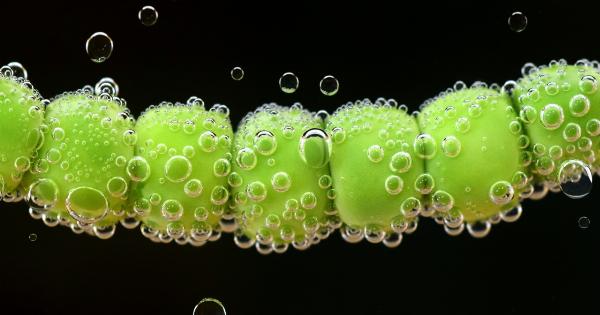If you have been diagnosed with Hashimoto’s thyroiditis, it’s important to understand that your diet plays a crucial role in managing this autoimmune condition.
Hashimoto’s thyroiditis is an inflammatory disease that affects the thyroid gland, leading to an underactive thyroid (hypothyroidism). While medication and lifestyle changes are important aspects of managing this condition, avoiding certain foods can help alleviate symptoms and reduce inflammation.
In this article, we will explore the top foods to avoid with a Hashimoto’s thyroiditis diagnosis.
1. Gluten
Gluten is a protein found in grains like wheat, barley, and rye. People with Hashimoto’s thyroiditis often have an increased risk of gluten intolerance or celiac disease.
Consuming gluten can trigger an immune reaction, leading to inflammation and worsening of Hashimoto’s symptoms. It is highly recommended to avoid foods that contain gluten, including bread, pasta, cakes, and pastries.
2. Soy-based Products
Soy and soy-based products contain compounds called isoflavones, which can interfere with thyroid function. These compounds can inhibit the absorption of thyroid medication and aggravate hypothyroidism symptoms.
Soy products include tofu, soy milk, soy sauce, and edamame. It is advisable to limit or eliminate these foods from your diet to support thyroid health.
3. Cruciferous Vegetables
Cruciferous vegetables like broccoli, cauliflower, cabbage, and kale are considered goitrogens. Goitrogens are substances that can interfere with iodine uptake by the thyroid gland, potentially worsening hypothyroidism symptoms.
While these vegetables offer numerous health benefits, it is recommended to moderate their consumption and ensure they are cooked properly before consumption to minimize their goitrogenic effect.
4. Processed Foods
Processed foods are typically high in refined carbohydrates, unhealthy fats, and additives, all of which can contribute to inflammation and weight gain.
Weight management is crucial for individuals with Hashimoto’s thyroiditis as excess weight can further strain thyroid function. To optimize thyroid health, it is best to avoid processed foods such as packaged snacks, sodas, sugary desserts, and fast food.
5. Sugary Foods and Artificial Sweeteners
Excessive consumption of sugary foods and artificial sweeteners can lead to blood sugar imbalances and hormonal disruptions. These changes can have a negative impact on thyroid function and exacerbate Hashimoto’s symptoms.
It is essential to limit your intake of sugary treats, soda, and foods containing artificial sweeteners like aspartame and sucralose.
6. High-Fat Foods
Avoiding high-fat foods, particularly those rich in unhealthy fats like trans fats and saturated fats, is beneficial for managing Hashimoto’s thyroiditis. These fats can contribute to inflammation and weight gain.
Limit your consumption of fried foods, fatty cuts of meat, full-fat dairy products, and processed snacks to support your thyroid health.
7. Dairy Products
For some individuals with Hashimoto’s thyroiditis, consuming dairy products can trigger an inflammatory response and worsen autoimmune symptoms.
It is advisable to assess your tolerance to dairy and consider alternatives like almond milk or coconut milk. If you choose to include dairy in your diet, opt for low-fat or lactose-free options.
8. Excessive Caffeine
Caffeine acts as a stimulant and can interfere with thyroid hormone absorption. Additionally, excessive caffeine intake can disrupt sleep patterns and contribute to adrenal fatigue, which is commonly associated with Hashimoto’s thyroiditis.
Limit your consumption of caffeinated beverages like coffee, energy drinks, and certain teas to support optimal thyroid function.
9. Alcohol
Alcohol consumption can negatively impact thyroid function, particularly if you have an underactive thyroid. Alcohol can interfere with the conversion of T4 (inactive thyroid hormone) to T3 (active thyroid hormone) and disrupt hormone balance.
It is best to limit or avoid alcohol to maintain thyroid health.
10. High-iodine Foods
Iodine plays a vital role in thyroid hormone production, but excessive iodine intake can trigger or worsen Hashimoto’s thyroiditis symptoms.
Foods rich in iodine include seaweed, certain types of fish (e.g., cod and tuna), shrimp, and iodized salt. Consult with a healthcare professional to determine the appropriate iodine intake for your condition.
Conclusion
While there is no one-size-fits-all diet for individuals with Hashimoto’s thyroiditis, making mindful food choices plays a significant role in managing this condition.
Avoiding gluten, soy-based products, cruciferous vegetables, processed foods, sugary foods, artificial sweeteners, high-fat foods, dairy products, excessive caffeine, alcohol, and high-iodine foods can help reduce inflammation, support thyroid function, and alleviate symptoms. It is essential to work closely with a healthcare professional or a registered dietitian to create an individualized diet plan that addresses your specific nutritional needs.





























